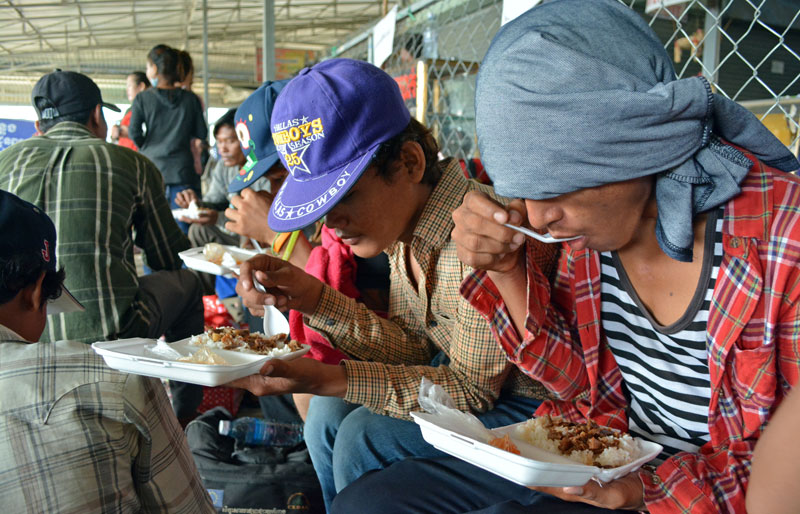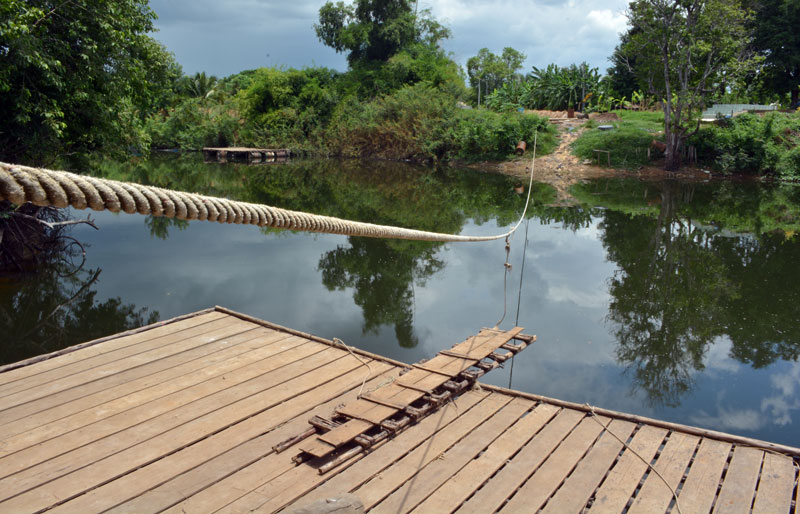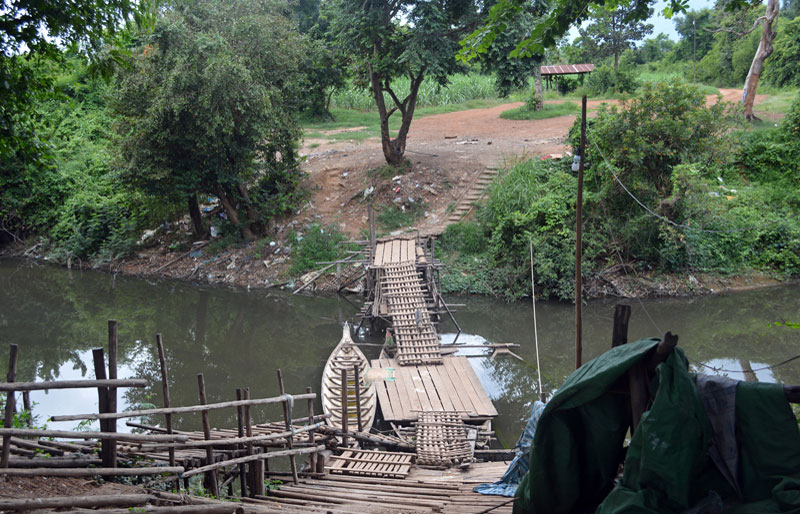POIPET CITY, Banteay Meanchey province – When So Khim, a 24-year-old from an impoverished rice-farming family in Pursat province, decided recently that he wanted to find a job in Thailand, he did not even consider applying for a passport to cross the border legally.
Instead, he paid a broker $15 and joined a group of 90 other villagers from across the country, all as desperate as he was to work in Thailand. Together they trekked through dense forest last week and snuck across the border in Banteay Meanchey province’s Malai district.

“When we got into Thailand, about 10 Thai soldiers were waiting on the other side,” Mr. Khim said. “They shot three times in the air and told us not to move.”
Mr. Khim dropped to the ground and cooperated with the soldiers, who transferred him to police custody. He and the other migrants were held by police overnight before being shipped back to Cambodia through the Poipet International Checkpoint on Sunday.
Despite a government strategy to help migrant workers return to Thailand legally after nearly 250,000 workers flooded back to Cambodia last month amid rumors of a crackdown, thousands are again crossing the border illegally.
At least 5,000 workers migrating illegally have been caught and returned by Thai authorities since June 28 in Banteay Meanchey province alone. The province shares a 153-km border with Thailand, with hundreds of illegal border crossings easily accessible.
To discourage illegal crossings, the government slashed the price of passports from $124 to $4 last month, but the application process is still complicated and time-consuming, and many migrants say they are confused about how to apply.
“I never heard of any policy from the government,” said Mr. Khim. “The government should share the information with people in the villages and communes.”
Not a single worker has yet completed the process, or even reached the passport application stage, since the June 24 announcement, according to the Interior Ministry.
In order to qualify for the $4 passport, workers must obtain proof of employment from a recruitment agency enlisted by the government, or from a Thai employer, and take it to the Ministry of Labor in Phnom Penh.
The ministry will then provide a certification letter to the worker, who must take it to the passport office in Phnom Penh to secure the $4 passport. After that, workers must apply for a Thai work visa. The entire process can take nearly 60 days to complete.
Than Kim Seng, deputy director general of the Ministry of Interior’s passport department, said his department has “not yet received a request for a passport” from the Ministry of Labor.

An Bun Hak, president of Top Manpower recruitment agency, one of nearly 50 enlisted by the government to help send workers back to Thailand, said his company has not received adequate guidelines from the government.
“The process needs to be clarified,” said Mr. Bun Hak, who is concerned some workers seeking his help may be trying to get a $4 passport without going to Thailand for work, which would cost him money since the employers pay him a commission for delivering workers.
Mr. Bun Hak said his agency has taken down the names of a few hundred workers, but has not yet processed their applications because of the confusion.
“The government needs to show guidelines for the workers and agencies,” he said. “What are the steps?”
Kousoum Saroeuth, governor of Banteay Meanchey, said the government’s initiative is broken.
“It is hard that only the Ministry of Labor can give certification to the people,” he said. “They should leave it to the district or department.”
Mr. Saroeuth said the Ministry of Labor should consider decentralizing the process of issuing passports to migrants.
“The district official can work with the [local] department of labor, and they all can work with the commune chief and village chief since they know their people very well,” he said.
Labor Ministry Undersecretary of State Sat Samoth declined to comment on the situation, while other ministry officials could not be reached.
Nuth Sam Ol, a project consultant with the International Organization for Migration who has been assisting returning workers in Poipet City, said many migrant workers are choosing illegal crossings over the new system because they are either not aware of it or do not understand it.
“The issue is that the government announced the new changes for passports and the legal process, but no one has received any information,” he said.

Mr. Sam Ol added that many workers migrate seasonally, returning to Cambodia for the rice harvest and leaving for Thailand again afterward.
“They only have a few months’ time,” he said. “They do not want to wait for the government’s process.”
Yort Nang, Domrey commune chief in Kompong Thom province, where more than 1,000 migrant workers returned last month, said villagers have again been leaving to sneak into Thailand via Banteay Meanchey.
“They keep asking me for information on how to get a passport, but I do not know about the process,” said Ms. Nang. “I have nothing to tell them. I am not sure how to do it and where the passports can get processed.”
Phou Keo, 20, and her husband Ly Sinath, 21, were working in Thailand as construction workers before the coup. They had crossed illegally and tried to do so again on Sunday but were caught by Thai soldiers.
“Going there illegally is easier and faster,” said Ms. Keo, who lives in Banteay Meanchey’s Thma Puok district and plans to attempt crossing illegally again soon.
“I want to have a passport, and I heard on the radio that it costs only $4, but I went to ask for one and they said it costs $150 dollars,” she said. She had apparently not taken the proper steps before requesting the $4 passport.
“I would like them to come and help us process the passport in our village,” Ms. Keo said.
Just a few kilometers from the Poipet International Checkpoint, multiple illegal crossings line Stung Bot, a stream shared by Cambodia and Thailand. One of them lies just beside the Stung Bot Border Defense Police Office.
A border police officer working there, who spoke on condition of anonymity because he is involved in illegal activities, explained that every night, for about $3 each, 30 to 50 workers jump onto a dinghy and tug at a rope to pull themselves across the water.
“I can take you over there because police over there know me,” he said.



